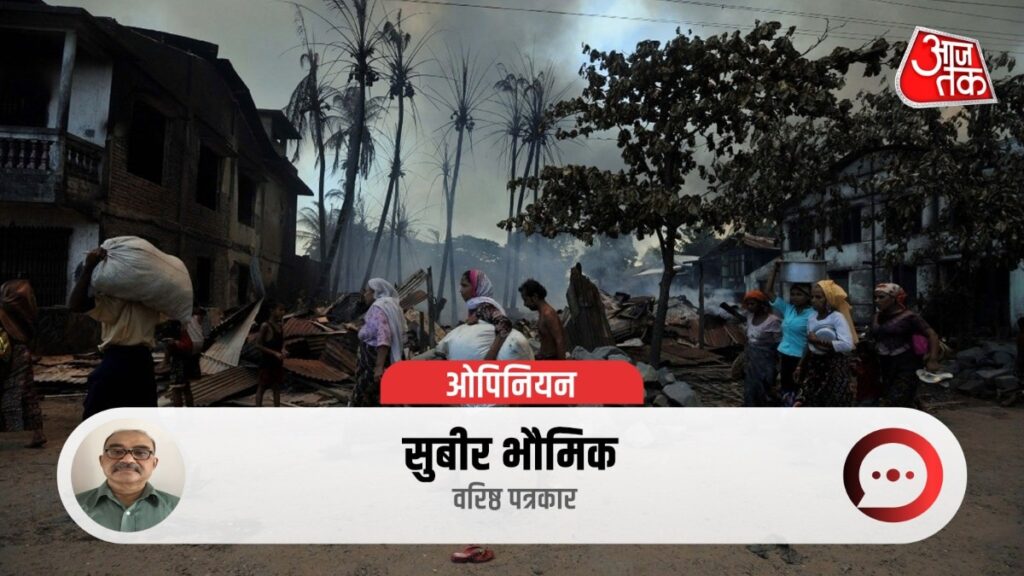Amid the fierce civil war in Myanmar and political turmoil in Bangladesh, India’s ‘Act East’ policy has come under serious threat. This policy was launched with the aim of strengthening economic and strategic relations between India’s Northeast and Southeast Asia, but it is now facing obstacles due to the changing political scenarios in Myanmar and Bangladesh.
The situation in Myanmar is getting worse
The ongoing conflict between the ruling military junta (Tatmadaw) and various ethnic rebel groups in Myanmar has pushed the country into a state of civil war. The Burmese army’s control over Rakhine (formerly Arakan) province, where a large part of India’s ambitious Kaladan Multi-Modal Transport (KMT) project is located, now appears to be weakening.
A large part of Rakhine state is now under the control of the separatist Arakan Army, which is trying to establish an independent state on the Myanmar-Bangladesh border. The Arakan Army has launched a massive deployment to capture Sittwe (formerly Akyab), the administrative headquarters of Rakhine state. If the city falls to the rebels, it will be a major strategic defeat for Myanmar and could also pose a serious crisis for India.
Increasing power of Arakan Army
The strength of the Arakan Army is not limited to its own successes, but it is further strengthening its position by forming alliances with other insurgent groups. In late July, the Kokang insurgent group MNDAA defeated the Burmese army and captured the city of Lashio in northern Shan state, which is located on the border with China. This was a major defeat for the Burmese army, as Lashio was the headquarters of their Northeast Command.
In addition, the Kachin Independence Army (KIA) also achieved a significant victory against the Burmese army when they captured the headquarters of the Burmese Light Infantry Battalion (LIB) 437 in Kachin State. Inspired by these victories, the Arakan Army is now planning to capture Sittwe to formally declare independence from Myanmar.
Challenges for India
The situation is even more complicated for India. India has invested $484 million in the modernization of the Sittwe port in Rakhine province under the Kaladan Multi-Modal Transport Project. This project is vital for connecting India’s northeastern states with Myanmar and beyond to Southeast Asia. However, the deteriorating situation in Myanmar is creating many obstacles in completing this project.
The Arakan Army has obstructed the project in the past as well, especially when the Indian Army carried out ‘Operation Sunshine’ on their bases in Myanmar along the Mizoram border. However, during its campaign against the Tatmadaw last year, the Arakan Army had indicated that it would not oppose these connectivity projects as these could be beneficial to the Rakhine state’s economy. But, if the Arakan Army declares its independence from Myanmar and India does not recognise it, the project could be in jeopardy altogether.
Role of China
China has also invested in big projects like deep sea port and oil-gas pipeline in Rakhine province. Although the Arakan Army may avoid attacking Kyaukphyu port to avoid angering China, its plan to capture Sittwe can also become a headache for China.
Impact on India’s ‘Act East’ policy
An important part of India’s ‘Act East’ policy is the Kolkata-Bangkok Highway, also known as the Trilateral Highway. The project aims to enhance connectivity between India, Myanmar and Thailand, but its completion and commissioning is now becoming difficult due to the deteriorating situation in Myanmar.
Apart from this, after the dismissal of Sheikh Hasina in Bangladesh, the opposition parties there are demanding a review of the agreements made with India, which may further put Delhi’s ‘Act East’ policy in trouble.
Political instability in Myanmar and Bangladesh has put India’s ‘Act East’ policy in serious trouble. The civil war in Myanmar and the growing influence of the Arakan Army in Rakhine province have raised questions about the future of India’s connectivity projects. In the coming months, India will have to find new strategic measures to protect its interests under its Act East policy.
Source (PTI) (NDTV) (HINDUSTANTIMES)
